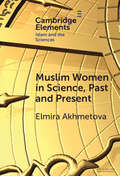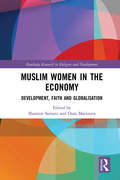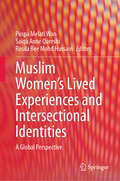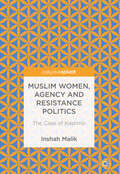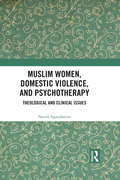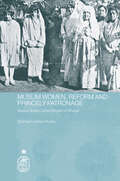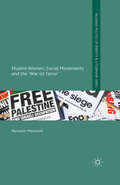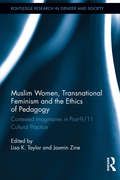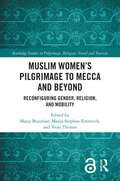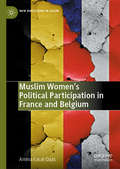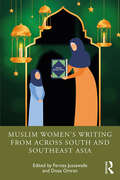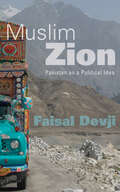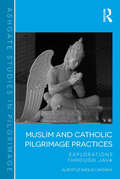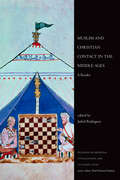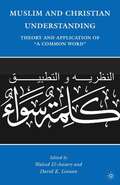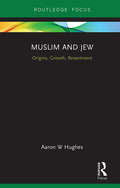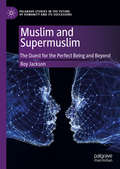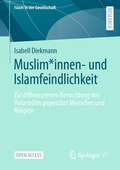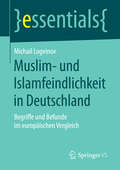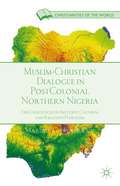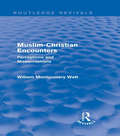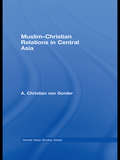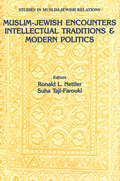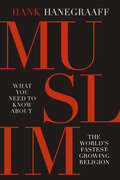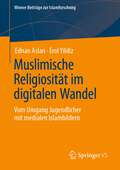- Table View
- List View
Muslim Women in Science, Past and Present (Elements in Islam and Science)
by Elmira AkhmetovaThis Element examines issues related to Muslim women's engagement in science and scholarship both past and present. The first two parts discuss the contributions made by Muslim women to scholarly, scientific, and technological advancements. The third part discusses the factors that have contributed to a decline in Muslim women's scholarly involvement in Islamic civilisation, the veracity of historical accounts, and the constraints in original knowledge production in contemporary Muslim societies. It finds that there are no religious restrictions rooted in the Qur'an that forbid women from pursuing a profession in science, whether as learners or practitioners. Yet some economic and political circumstances, cultural influences, and outdated interpretations of Islam produce discrimination against women in Muslim societies, and lead to their underrepresentation in scientific research and academia.
Muslim Women in the Economy: Development, Faith and Globalisation (Routledge Research in Religion and Development)
by Shamim Samani Dora MarinovaThis book explores the changing role of Muslim women in the economy in the twenty-first century. Sociological developments such as secular education, female-focused policies, national and global commitments to gender equality as well as contemporary technological advances have all served to shift and redefine the domestic and public roles of Muslim women, leading in many places to increases in workplace participation and entrepreneurship. The volume investigates the contexts of these shifts and the experiences of women balancing faith and other commitments to actively engage in the economy in vastly different countries. The book looks at how family codes and the understandings of Muslim male and female roles sit alongside social and economic advances and the increases in women partaking in the economy. Within a globalised world, it also highlights the importance of the implementation of the current sustainable development priorities in the context of Muslim societies, including Sustainable Development Goal 5 that focuses on the vital role of women and their full participation in all areas of sustainable development. With cases ranging from Saudi Arabia, Iran, Bangladesh, Pakistan, Indonesia, Nigeria, Kenya through to Spain, Bulgaria and Australia, Muslim Women in the Economy will be of considerable interest to those studying, researching and interested in gender, development and religious studies.
Muslim Women's Lived Experiences and Intersectional Identities: A Global Perspective
by Puspa Melati Wan Saiqa Anne Qureshi Rosila Bee Mohd HussainThis volume takes a global perspective on intersectionality embodied by Muslim women. It addresses questions such as balancing multiple identities, lived experiences and complex realities, and the role of faith in social roles. The chapters debunk the idea of Islam or gender being monoliths. They layer faith over gender across the globe and consider migration as an important factor, thereby exploring intersectional identities that are understudied and under-evaluated. The volume overall brings to life Islamic women's lives in all their richness and differences, with discussions on social roles, positions, initiatives, and occupations across regions. It provides recommendations and suggestions for readers to understand the complex realities of Muslim women as well as serves as a guide for practitioners and policy-makers.
Muslim Women, Agency and Resistance Politics: The Case of Kashmir
by Inshah MalikThis book investigates agency in the historical resistance movement in Kashmir by initiating a fresh conversation about Muslim Kashmiri women. It exhibits Muslim women not merely as accidental victims but conscientious agents who choose to operate within the struggles of self-determination. The experience of victimization stimulates women to take control of their lives and press for change. Despite experiencing isolating political conditions, Kashmiri women do not internalize their supposed inferiority. The author shows that women’s struggles against patriarchy are at the heart of a very complex historical resistance to the Indian rule.
Muslim Women, Domestic Violence, and Psychotherapy: Theological and Clinical Issues
by Nazila IsgandarovaMuslim Women, Domestic Violence, and Psychotherapy reconciles newly emerging Islamic practical theology with the findings and theories of contemporary social sciences. It is an inquiry about the lived experience of the Islamic tradition and its application in Islamic counseling with Muslim women subject to domestic violence. By incorporating a holistic examination of the worldview, personhood, and understanding of social and religious obligations of Muslim women in counseling, this book shows how practitioners can empower clients facing trauma and abuse to explore feasible solutions and decrease worry, anxiety, and other negative emotions.
Muslim Women, Reform and Princely Patronage: Nawab Sultan Jahan Begam of Bhopal (Royal Asiatic Society Books)
by Siobhan Lambert-HurleyThis is a new and engaging examination of the emergence of a Muslim women’s movement in India. The state of Bhopal, a Muslim principality in central India, was ruled by a succession of female rulers throughout the nineteenth and twentieth centuries, most notably the last Begam of Bhopal, Nawab Sultan Jahan Begam. Siobhan Lambert-Hurley puts forward the importance for early Muslim female activists to balance continuity and innovation. By operating within the framework of Islam, these women built on traditional norms in order to introduce incremental change in terms of veiling, female education, marriage, motherhood and women's political rights. For the first time, this book analyzes the role of the ‘daughters of reform', the first generation of Muslim women who contributed to the reformist discourse, particularly at the regional level. Based on numerous primary sources in Urdu, including the tracts, books, reports, letters and journal articles of Sultan Jahan Begam and the other women of Bhopal along with official records such as the reports of early organizations and institutions in the Bhopal State, the author sheds light on an important part of India’s history.
Muslim Women, Social Movements and the 'War on Terror' (Palgrave Politics of Identity and Citizenship Series)
by Narzanin MassoumiOn 15th February 2003, two million people marched in the streets of London to call on the British government not to go to war with Iraq. Though Britain did enter war, the movement did not rest in defeat. This book tells the story of what happened behind the scenes of this extraordinary mass movement, looking specifically at the political relationship between Muslim and leftist activists.Crisis narratives about Muslims assume that they are only engaged with sectarian communalist forms of identity politics or that their supposed religious and social conservatism is incompatible with progressive values. Through telling this story, Massoumi looks closely at the role of identity politics within social movements, considering what this means in practice and whether we can meaningfully speak of identity politics. Arguing that identity politics can only be understood within the context of a wider social and political structure, this book analyses the conditions through which Muslim and leftist engagement emerges within this movement, and highlights the decisive leadership of Muslim women.
Muslim Women, Transnational Feminism and the Ethics of Pedagogy: Contested Imaginaries in Post-9/11 Cultural Practice (Routledge Research in Gender and Society #42)
by Jasmin Zine Lisa K. TaylorFollowing a long historical legacy, Muslim women’s lives continue to be represented and circulate widely as a vehicle of intercultural understanding within a context of the "war on terror." Following Edward Said’s thesis that these cultural forms reflect and participate in the power plays of empire, this volume examines the popular and widespread production and reception of Muslim women’s lives and narratives in literature, poetry, cinema, television and popular culture within the politics of a post-9/11 world. This edited collection provides a timely exploration into the pedagogical and ethical possibilities opened up by transnational, feminist, and anti-colonial readings that can work against sensationalized and stereotypical representations of Muslim women. It addresses the gap in contemporary theoretical discourse amongst educators teaching literary and cultural texts by and about Muslim Women, and brings scholars from the fields of education, literary and cultural studies, and Muslim women’s studies to examine the politics and ethics of transnational anti-colonial reading practices and pedagogy. The book features interviews with Muslim women artists and cultural producers who provide engaging reflections on the transformative role of the arts as a form of critical public pedagogy.
Muslim Women’s Pilgrimage to Mecca and Beyond: Reconfiguring Gender, Religion, and Mobility (Routledge Studies in Pilgrimage, Religious Travel and Tourism)
by Manja Stephan-Emmrich Marjo Buitelaar Viola ThimmThis book investigates female Muslims pilgrimage practices and how these relate to women’s mobility, social relations, identities, and the power structures that shape women’s lives. Bringing together scholars from different disciplines and regional expertise, it offers in-depth investigation of the gendered dimensions of Muslim pilgrimage and the life-worlds of female pilgrims. With a variety of case studies, the contributors explore the experiences of female pilgrims to Mecca and other pilgrimage sites, and how these are embedded in historical and current contexts of globalisation and transnational mobility. This volume will be relevant to a broad audience of researchers across pilgrimage, gender, religious, and Islamic studies.
Muslim Women’s Political Participation in France and Belgium (New Directions in Islam)
by Amina Easat-DaasThis book outlines the principal motivations, opportunities and barriers to Muslim women’s political participation in France and francophone Belgium. Easat-Daas draws on in-depth comparative contextual analysis along with semi-structured interview material with women from France and Belgium who self-identify as Muslim and are active in a variety of modes of political participation, such European Parliamentarians, Senators, councilwomen, trade-union activists and those engaged in grass-roots political movements. This provides an alternative framing of Muslim women, removed from the tired and often exaggerated stereotypes that portray them as passive objects or sources of threat, instead highlighting their remarkable resilience and consistent determination. Through exploring the intersecting fault lines of racial, Islamophobic and gendered struggles of Muslim women in these two cases, this book also sheds new light on the role of ‘European Islam’, political opportunity structures, secularism and Muslim women’s dress.
Muslim Women’s Writing from across South and Southeast Asia
by Feroza JussawallaThis essential collection examines South and Southeast Asian Muslim women’s writing and the ways they navigate cultural, political, and controversial boundaries. Providing a global, contemporary collection of essays, this volume uses varied methods of analysis and methodology, including: • Contemporary forms of expression, such as memoir, oral accounts, romance novels, poetry, and social media; • Inclusion of both recognized and lesser-known Muslim authors; • Division by theme to shed light on geographical and transnational concerns; and • Regional focus on Afghanistan, Pakistan, India, Bangladesh, Sri Lanka, Malaysia, and Indonesia. Muslim Women’s Writing from across South and Southeast Asia will deliver crucial scholarship for all readers interested in the varied perspectives and comparisons of Southern Asian writing, enabling both students and scholars alike to become better acquainted with the burgeoning field of Muslim women's writing. This timely and challenging volume aims to give voice to the creative women who are frequently overlooked and unheard.
Muslim Zion: Pakistan as a Political Idea
by Faisal Devji“Offers a detailed analysis of the various political and ideological forces that were at play in the buildup to Pakistan’s creation.” (Los Angeles Review of Books)Pakistan is both the embodiment of national ambitions fulfilled and, in the eyes of many observers, a failed state. Muslim Zion cuts to the core of the geopolitical paradoxes entangling Pakistan to argue that India’s rival has never been a nation-state in the conventional sense. Pakistan is instead a distinct type of political geography, whose closest ideological parallel is the state of Israel.A year before the 1948 establishment of Israel, Pakistan was founded on a philosophy that accords with Zionism in surprising ways. Faisal Devji understands Zion as a political form rather than a holy land, one that rejects hereditary linkages between ethnicity and soil in favor of membership based on an idea of belonging. Like Israel, Pakistan came into being through the migration of a minority population, inhabiting a vast subcontinent, who abandoned old lands in which they feared persecution to settle in a new homeland. Just as Israel is the world’s sole Jewish state, Pakistan is the only country to be established in the name of Islam.Revealing how Pakistan’s troubled present continues to be shaped by its past, Muslim Zion is a penetrating critique of what comes of founding a country on an unresolved desire both to join and reject the world of modern nation-states.“A trenchant analysis . . . of Islamic politics.” ?Publishers Weekly“Intellectual history as a page-turner.” —Noah Feldman, author of Cool War: The Future of Global Competition“Brilliantly written, deeply felt . . . an important contribution.” —Anatol Lieven, author of Pakistan: A Hard Country“A remarkable book.” —New Republic
Muslim and Catholic Pilgrimage Practices: Explorations Through Java (Routledge Studies in Pilgrimage, Religious Travel and Tourism)
by Albertus Bagus LaksanaExploring the distinctive nature and role of local pilgrimage traditions among Muslims and Catholics, Muslim and Catholic Pilgrimage Practices draws particularly on south central Java, Indonesia. In this area, the hybrid local Muslim pilgrimage culture is shaped by traditional Islam, the Javano-Islamic sultanates, and the Javanese culture with its strong Hindu-Buddhist heritage. This region is also home to a vibrant Catholic community whose identity formation has occurred in a way that involves complex engagements with Islam as well as Javanese culture. In this respect, local pilgrimage tradition presents itself as a rich milieu in which these complex engagements have been taking place between Islam, Catholicism, and Javanese culture. Employing a comparative theological and phenomenological analysis, this book reveals the deeper religio-cultural and theological import of pilgrimage practice in the identity formation and interaction among Muslims and Catholics in south central Java. In a wider context, it also sheds light on the larger dynamics of the complex encounter between Islam, Christianity and local cultures.
Muslim and Christian Contact in the Middle Ages: A Reader (Readings In Medieval Civilizations And Cultures Ser. #18)
by Jarbel RodriguezTo study the interactions between Muslims and Christians in the medieval period is to observe a history of conflict and co-existence encompassing warfare, piracy, and raiding as well as commerce, intellectual exchanges, and personal relationships that transcended religious differences. With particular focus on the Mediterranean world, this collection of more than 80 readings includes sources from Byzantine, Jewish, Muslim, and Latin Christian authors that explore the conflicts and contacts between Muslims and Christians from the seventh to the fifteenth century. Jarbel Rodriguez has selected geographically diverse readings and multiple sources on the same event or topic so that readers gain a better understanding of the relationship that existed between Muslims and Christians in the Middle Ages.
Muslim and Christian Understanding
by Waleed El-Ansary David K. LinnanThis book explores 'A Common Word Between Us and You', a high-level ongoing Christian-Muslim dialogue process. The Common Word process was commenced by leading Islamic scholars and intellectuals as outreach in response to the Pope's much criticized Regensburg address of 2007.
Muslim and Jew: Origins, Growth, Resentment (Routledge Focus on Religion)
by Aaron W HughesMuslim and Jew: Origins, Growth, Resentment seeks to show how and why Islam and Judaism have been involved in political and theological self-definitions using the other since the seventh century. This short volume provides a historical and comparative survey of how each religion has thought about the other and, in so doing, about itself. It confines itself to those points at which Judaism and Islam intersect and cross-pollinate, and explores how this delicate process continues into the present with the Israeli–Palestinian conflict. Muslim and Jew thus seeks to move beyond the intersection of a monolithic Judaism and a monolithic Islam and instead examines and organizes the messiness of the encounter as both religions sought to define themselves within, from, and against the other.
Muslim and Supermuslim: The Quest for the Perfect Being and Beyond (Palgrave Studies in the Future of Humanity and its Successors)
by Roy JacksonThis book looks to the rich and varied Islamic tradition for insights into what it means to be human and, by implication, what this can tell us about the future human. The transhumanist movement, in its more radical expression, sees Homo sapiens as the cousin, perhaps the poorer cousin, of a new Humanity 2.0: ‘Man’ is replaced by ‘Superman’. The contribution that Islam can make to this movement concerns the central question of what this ‘Superman’ – or ‘Supermuslim’ – would actually entail. To look at what Islam can contribute we need not restrict ourselves to the Qur’an and the legal tradition, but also reach out to its philosophical and literary corpus. Roy Jackson focuses on such contributions from Muslim philosophy, science, and literature to see how Islam can confront and respond to the challenges raised by the growing movement of transhumanism.
Muslim*innen- und Islamfeindlichkeit: Zur differenzierten Betrachtung von Vorurteilen gegenüber Menschen und Religion (Islam in der Gesellschaft)
by Isabell DiekmannDieses Open-Access-Buch zeigt, dass feindliche Einstellungen gegenüber Muslim*innen oder als Muslim*innen markierten Menschen und gegenüber der Religion des Islams oftmals nur wenig differenziert betrachtet werden. Die mangelnde Trennschärfe zwischen Einstellungen gegenüber Menschen auf der einen und einer Religion auf der anderen Seite manifestiert sich etwa in Definitionen, in denen Islam und Muslim*innen in scheinbar untrennbarer Art und Weise zueinander konstruiert werden oder im Operationalisierungsprozess, wenn auf manifester Ebene Einstellungen gegenüber Muslim*innen erhoben werden, das Konstrukt jedoch als Islamfeindlichkeit bezeichnet wird. Diese Studie untersucht, (1) ob eine synonyme Verwendung der Begriffe gerechtfertigt ist oder ob sich empirisch nachweisen lässt, dass Islam- und Muslim*innenfeindlichkeit nicht identisch sind, (2) inwiefern Unterschiede im Ausmaß feindlicher Einstellungen gegenüber dem Islam und gegenüber Muslim*innen bestehen und (3) wie sich Deutungsrahmen der Befragten mit den Begriffen 'Islam' und 'Muslim*innen' voneinander unterscheiden. Die Zerlegung in seine Einzelteile ermöglicht es, das Phänomen in all seinen Dimensionen zu verstehen und wichtige theoretisch-konzeptionelle, methodologische und handlungspraktische Konsequenzen abzuleiten.
Muslim- und Islamfeindlichkeit in Deutschland: Begriffe und Befunde im europäischen Vergleich (essentials)
by Michail LogvinovMichail Logvinov geht in diesem essential der Frage nach, ob die in den deutschen Meinungsumfragen gemessene Islamfeindlichkeit bzw. Islamophobie eine spezifische Auspr#65533;gung hat. Er schl#65533;gt konsensf#65533;hige Begriffsbestimmungen vor, erarbeitet die Kriterien, an denen die Islam- und Muslimfeindlichkeit in Deutschland festgemacht werden k#65533;nnen, und geht auf deren historische und soziale Ursachen ein. Die Frage, was bei Islamfeindlichkeit eigentlich gemessen wird und ob es in Deutschland ein besonderes ,,Feindbild Islam" gibt, ist gerade in Zeiten der ,,Pegida" und neuen extremistischen Formationen wie den ,,Pro-Bewegungen" relevant. Setzt sich doch die (verstehende) Sozialwissenschaft zum Ziel, Aussagen #65533;ber die Qualit#65533;t sozialer Konflikte treffen und L#65533;sungsvorschl#65533;ge anbieten zu k#65533;nnen.
Muslim-Christian Dialogue in Postcolonial Northern Nigeria: The Challenges of Inclusive Cultural and Religious Pluralism (Christianities of the World)
by Marinus C. IwuchukwuIwuchukwu examines the perennial conflicts in different parts of northern Nigeria and why they are popularly called Muslim-Christian clashes. Specifically, he examines the immediate and remote factors that are responsible for the conflicts.
Muslim-Christian Encounters: Perceptions and Misperceptions (Routledge Revivals)
by William Montgomery WattFirst published in 1991, this title explores the myths and misperceptions that have underpinned Muslim-Christian relations throughout history, and which endure to the current day. William Montgomery Watt describes how the myths originated and developed, and argues that both Muslims and Christians need to have a more accurate knowledge and positive appreciation of the other religion. Chapters discuss the Qur’anic perception of Christianity, attitudes to Greek philosophy and the relationship between Islam and Christianity in medieval Europe. Written by one of the leading authorities on Islam in the West, Muslim-Christian Encounters remains a relevant and vivid study and will be of particular value to students of Islam, religious history and sociology.
Muslim-Christian Relations in Central Asia (Central Asian Studies)
by Christian van GorderThis book explores issues of cultural tension that affect Muslim and Christian interaction within the Central Asian context. It looks at the ways that Christians have interacted with Central Asian Muslims in the past, and discusses what might need to be done to improve Muslim-Christian relations in the region in the present and future. Since the time that Nestorian Christian missionaries traveled eastward from Asia Minor along the Silk Road, and Islamic cultures came to the region in the 7th century, Christians and Muslims have shared a unique relationship in a fascinating cultural milieu. Under the reigns of various conquerors, Czars, Soviets and modern nationalist strong-men, the ever changing political and economic situation of these former Soviet Republics has dramatically affected the ways that Muslims and Christians have practiced their faith. Today, as Muslims and Christians work to stabilize their interactions, they face new challenges because of the activities of Protestant Christian and Islamist missionaries who are flooding into Central Asia as never before. The book corrects common misunderstandings of Central Asia as a cultural backwater, and is a valuable introduction to Muslim and Christian interactions in one of the most quickly changing regions of the globe. It will appeal to readers interested in Muslim-Christian interaction, and for researchers in the field of World Religions, Central Asian Studies and Intercultural Studies.
Muslim-Jewish Encounters (Studies In Muslim-jewish Relations Ser. #Vol. 4.)
by NettlerFirst Published in 1998. Routledge is an imprint of Taylor & Francis, an informa company.
Muslim: What You Need To Know About The World's Fastest Growing Religion
by Hank HanegraaffIs Islam a peaceful and tolerant religion? How did it get started? World events are making it more timely, important, and necessary for every Christian to understand how the world&’s fastest-growing religion will affect them and how to stand firm in the truth of Christ.Renowned &“Bible Answer Man&” Hank Hanegraaff provides an in-depth look at Islam. For all the debate over Islam and its growing presence in the world, one thing is often overlooked: Islam is not a religion in the Western sense. It&’s an all-encompassing worldview opposed to anything but itself. While there may be millions of peaceful and tolerant Muslims, many of them our neighbors, Islam itself is not peaceful and tolerant.Islam is the only significant religious system in the history of the human race with a structure of laws that mandate violence against the infidel. The current narrative is that to tell the truth in this regard will radicalize Muslims and worsen hostilities. A common phrase you&’ve probably heard is that: &“Islam is not our enemy.&” As well-intentioned as this mantra may be, it is a dangerous stance once someone understands Islam in full.Global Islamic jihadism is exacting mass genocide on Christians in the East and multiplying terrorist attacks throughout the West. Worse still, Western governments, academic institutions, and media outlets seem bent on peddling a false narrative about what Islam truly is.In Muslim, you will:Learn the history of Islam, from the bloody career of the prophet Mohammed to the authoritarian Islamic lawExamine how Islamic theology refutes the core Christian beliefs of original sin, Jesus&’ resurrection, and moreDiscover specific Islamic teaching inciting violence to non-Muslims and even governments opposing Islamic lawFind solutions and encouragement for Christians to withstand this growing global threatThe conflict between Islam and the West is not going to die down or fade away. The Islamic doctrines upon which it is based will continue to cause conflict on an ever-increasing scale. With Muslim, Christians can equip themselves and others to stand unwavering in the truth of Christ.
Muslimische Religiosität im digitalen Wandel: Vom Umgang Jugendlicher mit medialen Islambildern (Wiener Beiträge zur Islamforschung)
by Erol Yildiz Ednan AslanDie Wirkungen der sozialen Medien sind besonders in Bezug auf das religiöse Engagement und die religiösen Praktiken junger Menschen zu beobachten – die heute unter Begriffen wie „Internetgeneration“, „Mediengeneration“ oder „Digital Natives“ zusammengefasst werden. Online-Medien üben großen Einfluss auf ihr Leben, ihr Weltverständnis, ihre religiösen Orientierungen und Handlungen aus. Ihre Identitätskonstruktionen, ihre kulturellen und religiösen Orientierungen sind aufs Engste mit sozialen Medien verflochten. Genau hier setzte die vorliegende Studie mit der Frage an, welche subjektiven Konsequenzen die Interaktion im Social Web für religiöse Orientierungen, Praktiken und Selbstentwürfe muslimischer Jugendlicher in Österreich hat. Dabei standen die Zusammenhänge zwischen Mediennutzung, medialen Islambildern und gelebter Religiosität im Mittelpunkt. Die Ergebnisse zeigen einerseits, dass der Umgang mit Social Media objektive Möglichkeitsräume schafft, die mit einer Erweiterung individueller Handlungsspielräume einhergehen können, wobei religiöse Autorität zunehmend hinterfragt wird. Andererseits geht aus der Studie ebenfalls hervor, dass die Nutzung digitaler Medien auch zur Verengung individueller religiöser Orientierungen führen kann.
